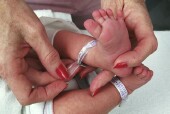
THURSDAY, Feb. 21 (HealthDay News) — New guidelines on testing newborns and children for genetic diseases recommend screening for childhood diseases but note that testing for diseases that strike in adulthood may not be worthwhile.
About 4 million infants in the United States undergo newborn screening each year, but further genetic testing — while increasingly available — is less common. Newborn screening panels vary from state to state.
All newborns should be tested for the genetic diseases that are included in their state’s newborn screening panel, but anything beyond that is up to parents and the decision must be made in the child’s best interest, according to the revised policy statement from the American Academy of Pediatrics and the American College of Medical Genetics and Genomics. The new guidelines are published online Feb. 21 in the journal Pediatrics.
The recommendations distinguish between genetic testing for childhood-onset conditions versus those for adult-onset conditions. For kids who may be at risk for a childhood disease, testing is worth considering, the guidelines state, but the same does not hold true if the child is thought to be at risk for a disease that strikes in adulthood.
“There is an important role for counseling before and after genetic screening,” added policy author Dr. Lainie Friedman Ross, a pediatrician and ethicist at the University of Chicago. “The focus should be on education of families, counseling them and helping them make decisions that focus on the child’s best interest.”
The new guidelines do not call for any specific genetic tests; instead they recommend mandatory offering of state newborn screening panels. “We believe that if parents are informed that the benefits outweigh the risks, that they will give their permission, given that all states screen for at least the uniform panel and it is included in costs of birth hospitalization,” Friedman Ross said.
Testing for disease in the presence of symptoms is another area addressed by the new recommendations. “Clearly, if a child has symptoms, we need a diagnosis to help the family make clinical decisions that are in the child’s best interest. This is important even when the disease has no current therapies,” Friedman Ross added.
Kids should also be informed of the results when they reach an appropriate age, she added.
The guideline authors caution against using direct-to-consumer genetic screening tests, because there is no oversight and the results are open to interpretation.
Pediatricians and geneticists said they are on board with the new recommendations.
“In newborns, we look for things that are treatable and have interventions that will have a significant impact on the child,” said Dr. Marshall Summar, division chief of genetics and metabolism at Children’s National Medical Center in Washington, D.C.
But “it’s a moving target,” he said. “We have to constantly reassess this as the technology and our understanding of what the results mean changes.”
There are risks when it comes to broad-based gene screens outside of traditional newborn screening panels, said Dr. Parul Jayakar, a clinical and metabolic geneticist at Miami Children’s Hospital. “We may find things that never come to fruition or results that we can’t fully interpret yet,” she explained.
However, there are also cases were being forewarned is being forearmed, said Dr. Joyce Fox, a medical genetics doctor at North Shore University Hospital in Manhasset, N.Y.
If there is a family history of a genetic disease, even adult-onset ones, there are some instances where knowing this early will make a difference. This includes certain cancers, including a rare type of inherited colon cancer. “We would want the information earlier so we can do appropriate surveillance on the children and prevent the onset of significant disease,” Fox said.
But it should be buyer beware when it comes to direct-to-consumer gene screens, she said.
“We highly discourage these even on adults, and particularly on children, because there is nobody there to provide counseling and interpretation,” Fox said. These can also be very costly, and are likely not covered by insurance.”
More information
Learn more about newborn screening at the U.S. National Institutes of Health.

